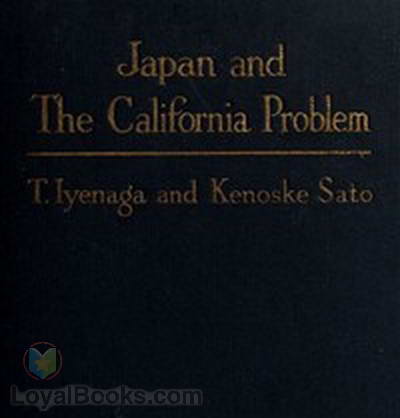Japan and the California Problem By: Toyokichi Iyenaga |
|---|

In the scholarly work "Japan and the California Problem" by Toyokichi Iyenaga, the author delves into the complex historical relationship between Japan and the state of California. This book presents a meticulously researched exploration of the interactions, conflicts, and cultural exchange between these two entities during a crucial period in history.
Iyenaga's work showcases his deep understanding of the subject matter, as he analyzes the events and factors that shaped the perception and treatment of Japanese immigrants in California. The book focuses primarily on the late 19th and early 20th centuries, when tensions between the United States and Japan were on the rise.
One of the standout features of this book is Iyenaga's extensive use of primary sources, including government documents, diaries, and letters. Each chapter is backed by compelling evidence, making this an invaluable resource for historians and researchers interested in the subject. I was particularly impressed by the author's ability to provide a nuanced and contextualized account of the various perspectives involved, making it clear that there was no single monolithic experience for Japanese immigrants in California.
Furthermore, I was captivated by the way Iyenaga highlights the importance of understanding the social and political climate of the time. By exploring topics such as labor issues, xenophobia, and discriminatory legislation, he effectively shows how these factors influenced the relationship between Japan and California. This comprehensive approach allows readers to gain a deeper comprehension of the challenges faced by Japanese immigrants and the evolving dynamics between the two regions.
While "Japan and the California Problem" is undoubtedly an academic work, its accessible writing style ensures that it can be appreciated by readers without an extensive background in the subject. I appreciate how Iyenaga introduces key concepts and historical events, ensuring that even readers with limited prior knowledge can follow along.
That said, one minor criticism is that, at times, the book's narrative structure can become disjointed. The author covers a broad range of topics, leading to occasional tangents or overly detailed discussions. However, Iyenaga's overall focus on providing a comprehensive analysis compensates for these minor shortcomings.
In conclusion, "Japan and the California Problem" by Toyokichi Iyenaga is a richly detailed and thoroughly researched book that offers an insightful exploration of the complexities inherent in the relationship between Japan and California during an important historical period. As a valuable resource for scholars and anyone interested in the historical interactions between different cultures, this book deserves recognition for shedding light on a significant chapter in transnational history. By T. Iyenaga, Ph.D. Professorial Lecturer in the Department of Political Science, University of Chicago and Kenoske Sato, M.A. Formerly Fellow in the University of Chicago G. P. Putnam's Sons New York and London The Knickerbocker Press 1921 Copyright, 1921 by G. P. Putnam's Sons Printed in the United States of America CONTENTS PAGE CHAPTER I INTRODUCTORY 3 CHAPTER II JAPANESE TRAITS AND PHILOSOPHY OF LIFE 9 Emotional Nature Æsthetic Temperament Group Consciousness Adaptable Disposition Spirit of Proletarian Chivalry Philosophy of Life New Turn in Thought. CHAPTER III JAPAN'S ASIATIC POLICY 33 Korean Situation Policy of Self Preservation Shantung Settlement Coöperation with China Understanding with America Japan's Proper Sphere of Activity. CHAPTER IV BACKGROUND OF JAPANESE EMIGRATION 50 Causes of Emigration and Immigration Japan's Land Area Agriculture Population Industry Social Factors... Continue reading book >>
|
| eBook Downloads | |
|---|---|
|
ePUB eBook • iBooks for iPhone and iPad • Nook • Sony Reader |
Kindle eBook • Mobi file format for Kindle |
|
Read eBook • Load eBook in browser |
Text File eBook • Computers • Windows • Mac |
| Review this book |
|---|